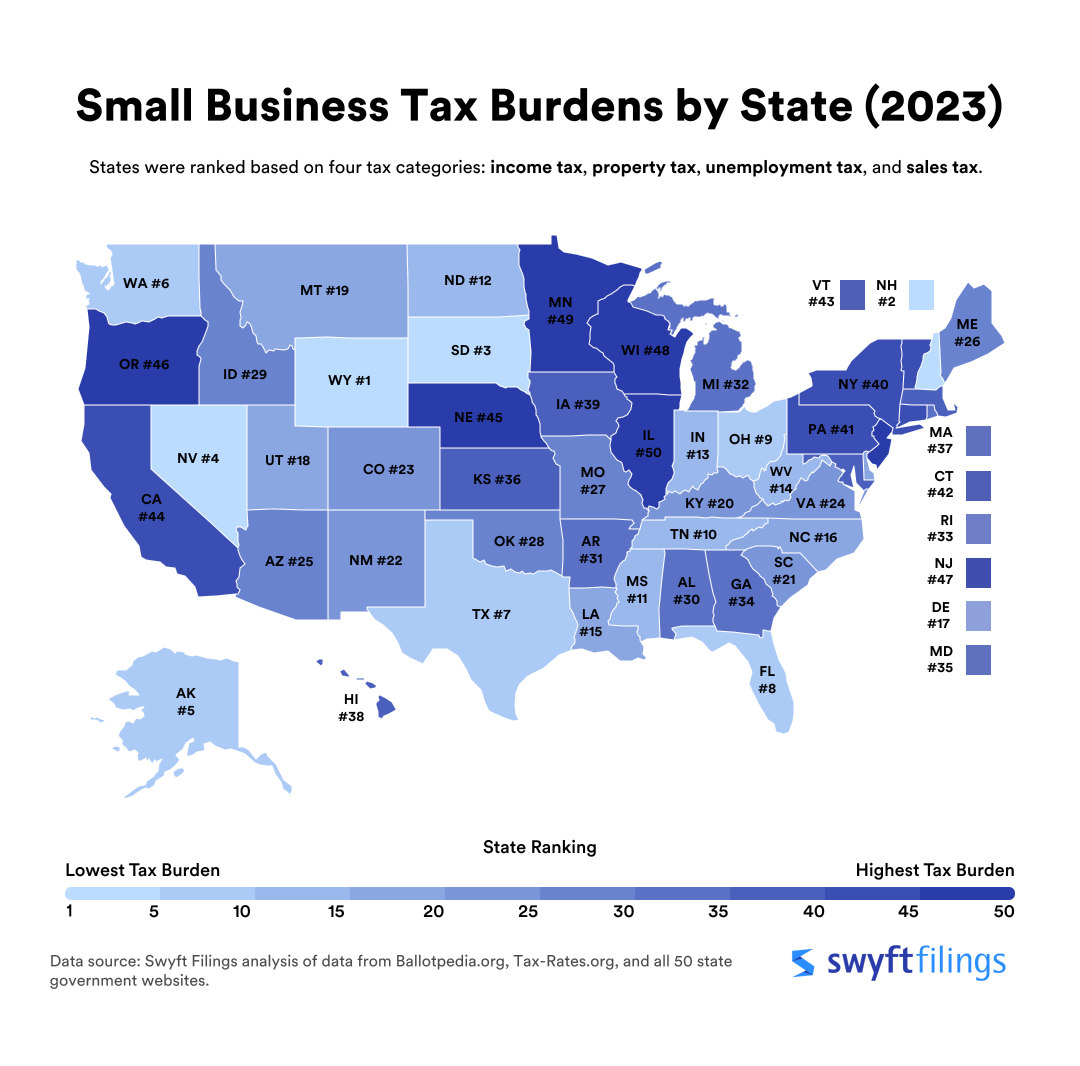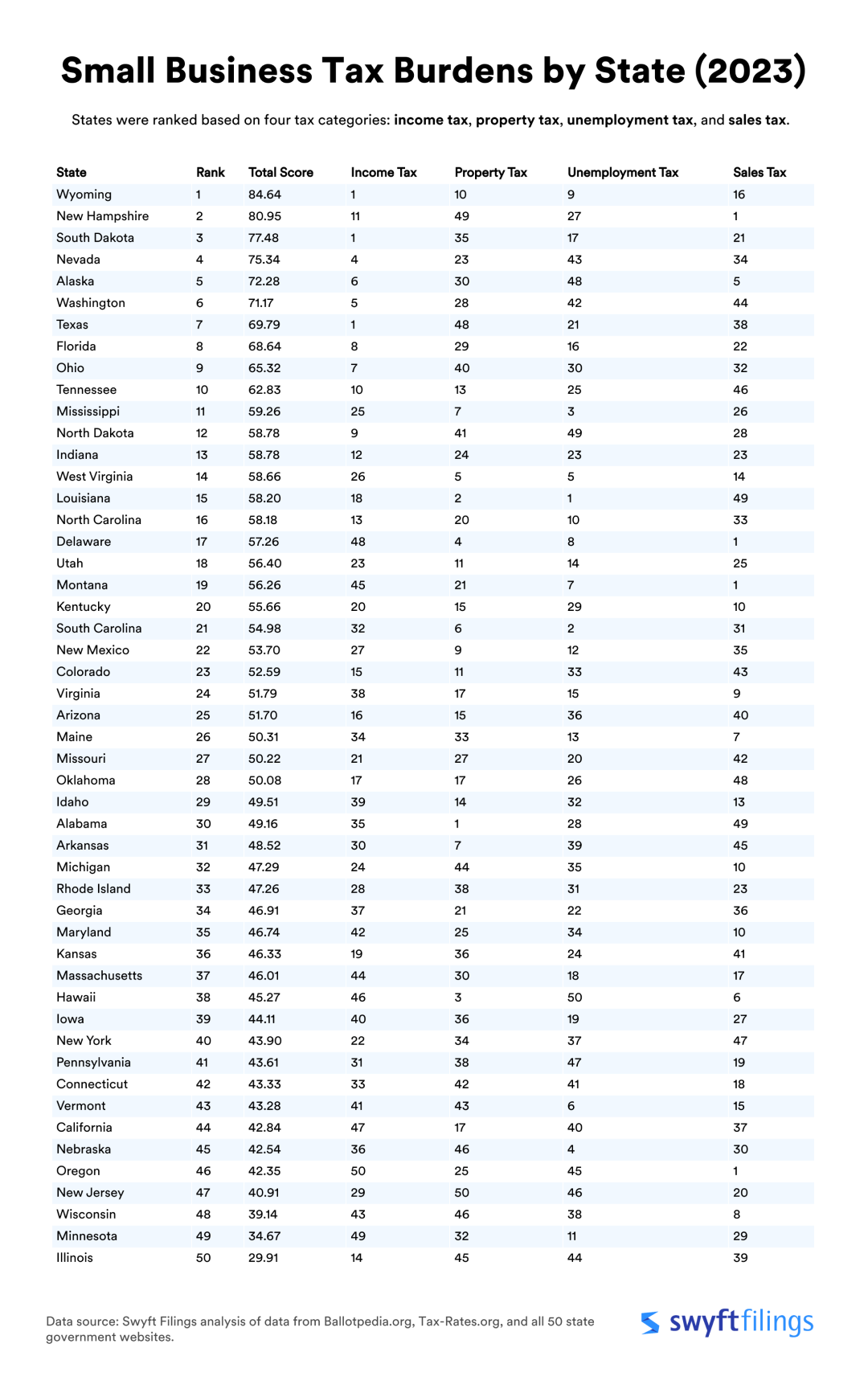Small businesses contribute significantly to job creation, innovation, and community development. In fact, they account for around 44% of U.S. economic activity and have historically generated about two-thirds of all new jobs. While many factors influence their growth and trajectory, the tax environment in each state represents a significant element of this complex equation.
High taxes provide necessary revenue for public services but can also pose challenges for small businesses. They may limit reinvestment opportunities, constrain hiring, and threaten business survival. As a result, some businesses may struggle to maintain a healthy bottom line, which in turn can lead to downsizing, stagnation, or even closure.
Recommended Videos
On the other hand, low taxes can help to facilitate business growth. They leave more resources for businesses to invest in innovation, workforce, and development. Lower taxes can enhance profitability, foster economic prosperity, and encourage entrepreneurial initiatives. This fiscal freedom can fuel a virtuous cycle of prosperity that benefits not just businesses but the communities and economies they serve.
Black Men Sundays talks about building generational wealth. Check out every episode in the media player below:
Swyft Filings analyzed the most recent data to identify the states with the lowest tax burden on small businesses. The study evaluated tax structures in each state based on a variety of factors, including corporate and individual tax rates, the sales tax on both a state and local level, property taxes, and unemployment insurance taxes, each of which contributes to the overall tax burden borne by small businesses.

Swyft Filings
Key takeaways
- National averages: Small businesses face an array of taxes that impact their bottom line. On average, across the United States, the state sales tax rate is 5.07%, supplemented by a local sales tax rate typically imposed at the county or city level, averaging an additional 1.33%. The burden of personal property tax on small businesses averages 0.98%. As for income tax, the average effective rate for individuals (the rate paid by sole proprietors and "pass-through" entities) stands at 3.95%, while corporations are taxed at a slightly higher average rate of 5.23%. Lastly, the average unemployment tax is at 4.14%. If a state did not levy a tax for any of these categories, the tax rate for that state was factored into the national average as 0%.
- Regional differences: Regional disparities in tax burdens faced by small businesses in the United States are evident when comparing average composite scores by region. The West leads the pack with an average score of 58.00, indicating a relatively lower tax burden on businesses. Trailing closely behind, the South offers a business-friendly tax environment with an average score of 56.04. The Midwest, while not as tax-advantageous, still presents a moderate average score of 49.55. However, businesses in the Northeast face the highest tax burden on average, as reflected in the region's average score of 48.84.

Swyft Filings
States with the lowest tax burdens on small businesses (2023)
10. Tennessee
- Individual income tax rate: None
- Corporate income tax rate: 6.50%
- State sales tax rate: 7.00%
- Average local sales tax rate: 2.45%
9. Ohio
- Individual income tax rate: 2.49%
- Corporate income tax rate: None%
- State sales tax rate: 5.75%
- Average local sales tax rate: 1.35%
8. Florida
- Individual income tax rate: None
- Corporate income tax rate: 5.50%
- State sales tax rate: 6.00%
- Average local sales tax rate: 0.65%
7. Texas
- Individual income tax rate: None
- Corporate income tax rate: None (the corporate tax threshold in Texas is $1.23 million)
- State sales tax rate: 6.25%
- Average local sales tax rate: 1.80%
6. Washington
- Individual income tax rate: None
- Corporate income tax rate equivalent: 0.85%
- State sales tax rate: 6.50%
- Average local sales tax rate: 2.39%
5. Alaska
- Individual income tax rate: None
- Corporate income tax rate: 4.00%
- State sales tax rate: None
- Average local sales tax rate: 1.76%
4. Nevada
- Individual income tax rate: None
- Corporate income tax rate: None
- State sales tax rate: 6.85%
- Average local sales tax rate: 1.30%
3. South Dakota
- Individual income tax rate: None
- Corporate income tax rate: None
- State sales tax rate: 4.00%
-- Average local sales tax rate: 1.83%
2. New Hampshire
- Individual income tax rate: None
- Corporate income tax rate: None (the corporate tax threshold in New Hampshire is $103,000)
- State sales tax rate: None
- Average local sales tax rate: None
1. Wyoming
- Individual income tax rate: None
- Corporate income tax rate: None
- State sales tax rate: 4.00%
- Average local sales tax rate: 1.83%
Methodology
To determine the state with the lowest tax burden on small businesses in 2023, the data and research team at Swyft Filings ranked each state using a composite score of factors across four key tax categories: income tax, property tax, unemployment tax, and sales tax. Below are the four categories and their percentage of the composite score.
Note: Rather than marginal tax rates, effective tax rates were used to score states, as they provide a clearer picture of the actual tax burden imposed. Income (individual and corporate) tax rates were calculated based on the annual median revenue of a U.S. small business of $78,000.
Income tax: 50% of composite score
- Individual income tax rate from state websites
- Corporate income tax rate from state websites
Property tax: 15% of composite score
- Median property tax rate
Unemployment tax: 15% of composite score
- Unemployment tax rate
- New employer tax rate
- SUTA wage base
Sales tax: 20% of composite score
- State sales tax rate
- Average local sales tax rate
This story was produced by Swyft Filings and reviewed and distributed by Stacker Media.